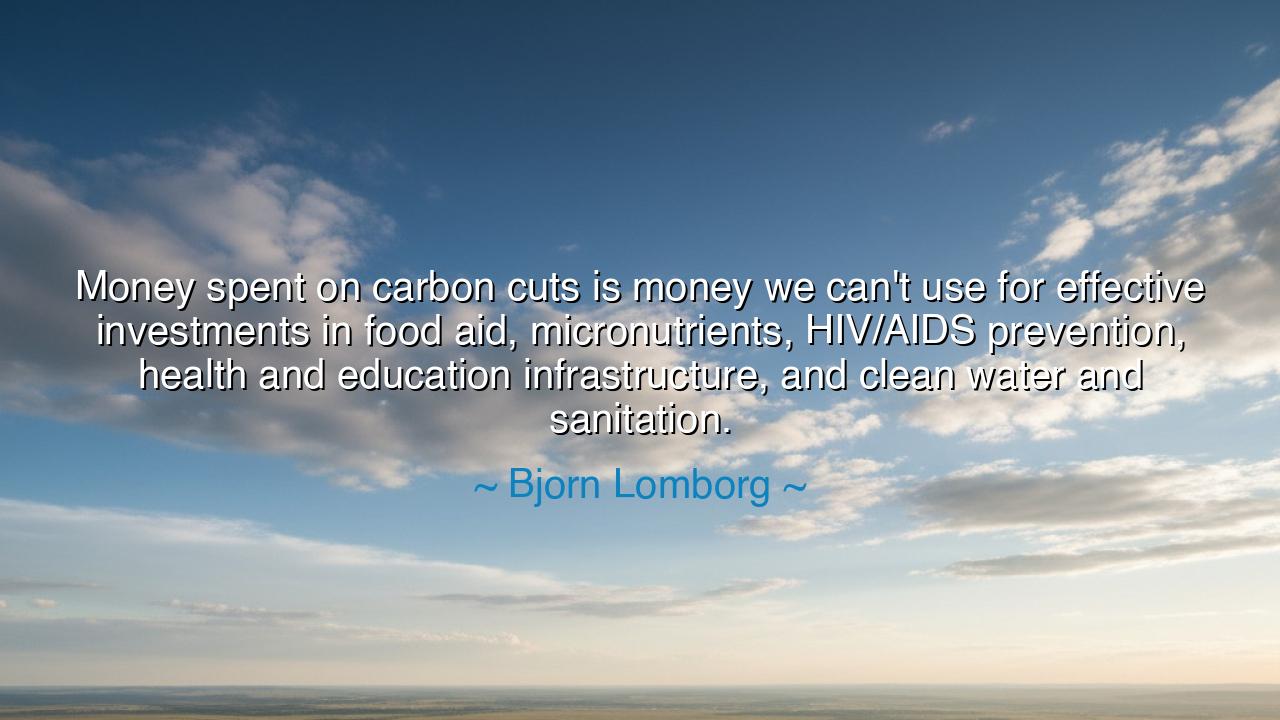
Money spent on carbon cuts is money we can't use for effective
Money spent on carbon cuts is money we can't use for effective investments in food aid, micronutrients, HIV/AIDS prevention, health and education infrastructure, and clean water and sanitation.






“Money spent on carbon cuts is money we can't use for effective investments in food aid, micronutrients, HIV/AIDS prevention, health and education infrastructure, and clean water and sanitation.” These words of Bjorn Lomborg, a thinker both praised and contested in the modern age, rise as a call for balance, for wisdom in the stewardship of human progress. They are not spoken against the need to protect the Earth, but as a reminder that the world’s compassion must be guided by reason. Lomborg’s voice urges mankind to see clearly the delicate scales of moral choice — that the wealth and energy of nations must serve not only the sky above, but the lives that walk upon the earth below.
In this declaration lies a profound tension — the eternal struggle between the ideal and the immediate, between the duty to the future and the suffering of the present. The ancients too wrestled with such dilemmas. When famine struck, kings who built monuments to the gods were condemned if their people starved beneath the shadow of their temples. The lesson is timeless: wisdom does not lie in the grandeur of one purpose alone, but in the harmonizing of all good purposes. Lomborg speaks as one who has seen that the wealth of nations is not infinite, and that to heal the world we must choose our remedies with discernment. To spend without reflection, even for noble causes, is to risk neglecting the very souls we wish to save.
Consider the parable of the physician with many patients. If he pours all his medicine into one vial, though his intent be pure, many will die while one is treated. So too, in Lomborg’s vision, if humanity devotes its vast treasures to cutting carbon emissions without first securing food, health, and water for the poor, it may heal the air while leaving millions to perish on the ground. The wise do not deny the danger of the storm, but they first shelter the children from the rain. True progress demands not haste but hierarchy — to tend first to the wounds that bleed, before seeking to prevent those that might someday form.
We see this truth reflected in the history of our kind. During the Green Revolution of the mid-20th century, men like Norman Borlaug faced a similar crossroads. The world cried of hunger, and while many debated over ideology and economics, Borlaug acted — developing resilient crops that fed more than a billion souls. He did not ignore the long future of the planet, but he knew that without life, there would be no future to preserve. His courage to prioritize the urgent needs of humanity over the allure of grand theory stands as living proof of Lomborg’s wisdom: that compassion must be practical, and the heart must serve through the hand.
Lomborg’s words also whisper a deeper truth: that every resource we spend carries the weight of opportunity. A dollar spent unwisely is a life left unaided. In a world where children die for lack of clean water, where disease steals the breath of the young, and where ignorance darkens the minds of the poor, it is not enough to act — we must act well. To save the Earth is righteous; to save its people is sacred. The true task of wisdom, then, is not to choose one over the other, but to align them, ensuring that every effort to heal the planet also heals those who dwell upon it.
Yet, let us not mistake Lomborg’s meaning as a call to abandon the fight against climate change. He does not preach denial but discernment. The ancients said that virtue lies in the golden mean — between excess and neglect. To ignore the warming Earth would be folly, but to forget the hungry and the sick in our haste to cool the air would be tragedy. The wise leader seeks both — to care for the earth’s breath and the body of mankind, with prudence guiding every action. For no solution born of imbalance can endure; only that which serves both heaven and earth will bring lasting harmony.
Therefore, O seekers of truth, remember this: goodness must be guided by wisdom, and wisdom by compassion. When you act for the world, weigh your choices as a just ruler would — asking not only what is noble, but what is needed, and when. Feed the hungry before you cleanse the air; build schools before you raise towers of policy. For the foundation of a strong world is a nourished humanity. And when at last mankind learns to balance mercy with foresight, it will find that every act of care — whether for the soil, the sky, or the soul — will rise together in a single, radiant harmony.
Thus, Bjorn Lomborg’s words, though born of our age, carry the eternal counsel of the ancients: choose wisely, act compassionately, and let no good cause destroy another. Only then will the wealth of the world, and the labor of its people, yield the fruits of true progress — a world where the earth is healed, and all her children are fed.






AAdministratorAdministrator
Welcome, honored guests. Please leave a comment, we will respond soon